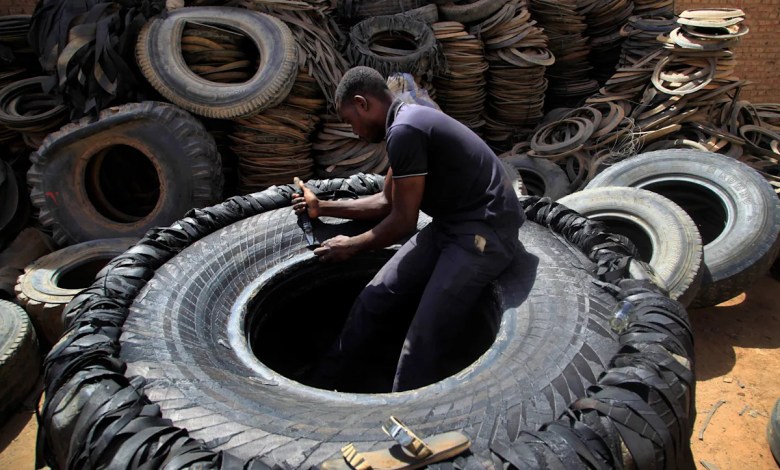As traveling is difficult in South Sudan, some scholars offer cheap feet made of rubber tires

WAU, South Sudan (AP) – from Rwanda to Kenya, the shoe fashion from lost tires have long been a sign of local intelligence.
In South Sudan, however, the creative hunting work is now viewed by the economic crisis that left the government in a multilingualism that strives to put food on the table.
As the South Sudan’s oil income has declined, the government Months could not afford civilian workers on time. Mail’s tribulation affects everyone from teachers from teachers, emphasizing economic crisis across the country, and many seek ways to continue.
Some are looking for cheap shoes, they do not get the shops but open markets where flip-flops and sandals appear in the production tires are usually thrown as waste.
The need is up and the cost of living
In Wau, some 650 miles (400 kilometers) from the DABA’s Sudan’s capital, Shoemaker Emmanuel Achuur working under Tarpaulin’s shade in the city’s large market.
His hands are the result of rubber and rubber, the aguul uses spots to draw pieces from the lost tires. Colored strips are scattered around him as puzzle pieces.
Chuuiil, who made two five to 10 per week, told AP that last months when he saw an increase in the highest quality of life here. They say that the foot shoes made of rubber metals find a strong place in local markets, vindicated in the display of ébiquitos in such shoes in the dove market.
Two years ago, Chuiil received five to seven customers a month. He now expects 20 of them, he said. Achuil shoes can download until 15,000 South Sudan Pound belts, or about $ 4, depending on the size and quality of completion. In addition to their access, devastated pairs is recommended for their stability.
“Even when things are bad – no matters, no jobs – this work is not a failure,” said Chuil. “People always need shoes, especially cheap.”
Akol Majok Ring, a cattlekeeper from the Warrap Status, said he found the sandals in March and quickly bought himself because he was “ready for cattle.”
“When you walk with cattle all day long, these sandals are perfect,” he said. “They stayed long and well prepared for work.”
Food insecurity and inflation affects millions
The South Sudan point is being pressed from 2023, loses its significance in Dollar as exported oils are disturbed by a civil war in the Sudan.
Economy has been drawn to five consecutive years, violated from the political competition between President Salva Kair and Riek Mamar deputy presidency, arrested by the house deputy.
Hyperinflation and full food insecurity affect approximately 80% 80 million people of 11 million people, the same number of people living under the poverty line, according to the world’s bank.
South Sudan depends on the oil income to meet 90% of the Year Budget, but injuries at the beginning of this year to Sudan’s oil leaving Sudan’s authorities.
The government announced early in June that it would be reused after the pipeline repair.
Many government workers work well without paying, and unemployment is rampant even prices for basic skyrocket goods. Skin shoes can seem to be luxury in these cases.
“Tire Soles last for a long time,” Dang Akol Asai, who was buying since Checuli for years. “I buy one couple, and keep me a year or more. They are strong, especially by going on bad roads.”
Shoemaker hopes to increase his business and train others
Gabriel Bathaku, 26 years old at Wau, said about “taking real problems. They just need to be recognized.”
Chuil has been making shoes since 1996. He is not legally trained. He has received his skills as a school of a distance looking at the older men in their workplaces as they accompany their business.
In those days abandoned tires was easy to find, Scavengen is reduced in garages or received by people who drop them away.
But now he said, “Many people do this work, so the competition of the materials is high.”
He cried for a lack of formal support, from government and others, which has left the craftsman to reach their trading tools. You want to access the better equipment.
Despite the difficulties, you dream of opening the right workshop where they will train others. He hopes that he will be able to increase his business and other cities in South Africa.
“If I had better cutting tools, and a way of raising, I trained young people,” he said. “Many do nothing here at Wau. This skill can help them to survive.”
___
Finding more in Africa and in Contact: https://apnews.com/hub/africa-pulse
The Associated Press receives support for Earth Health and Development in Africa from Sates Foundation. AP is responsible for all content. Find AP Relations Values for Benanthropies, Support List and Financial Support Places at AP.org.

